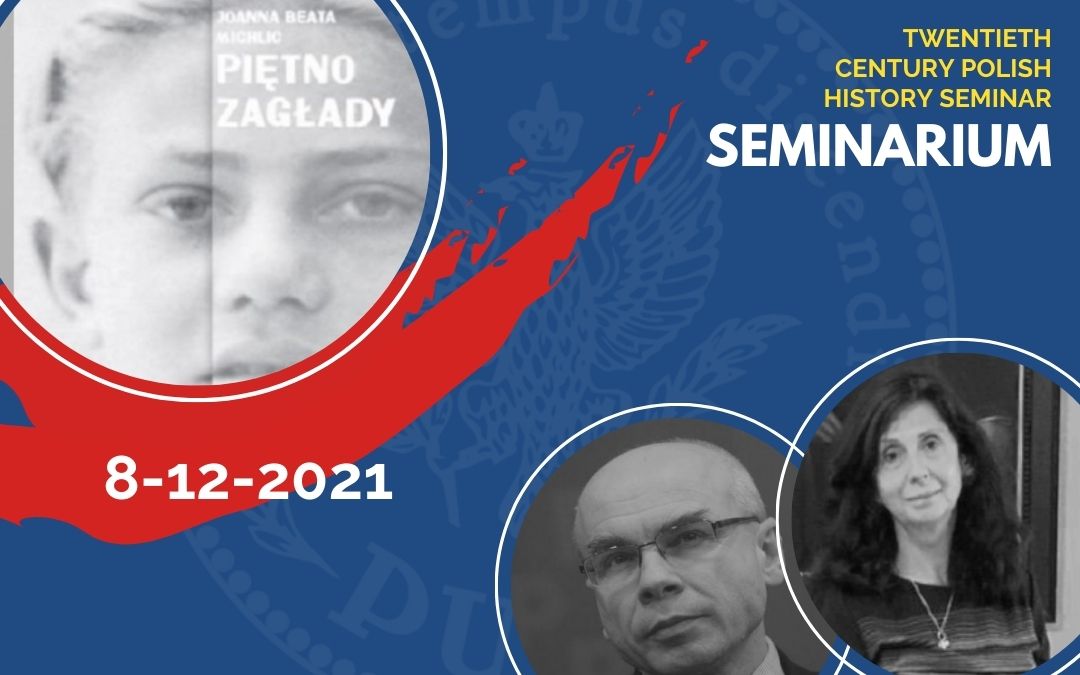Wydarzenie
Book launch „Piętno Zagłady: Wojenna i powojenna historia oraz pamięć żydowskich dzieci ocalałych w Polsce”, by Joanna Beaty Michlic.
Prof. Michael Fleming and dr Wojciech Rappak invite on 8th December 2021 at 6.15 PM GMT, as part of the seminar in cycle “Twentieth Century Polish History”, a book launch by Joanna Beata Michlic

In Piętno Zagłady Wojenna i powojenna historia oraz pamięć żydowskich dzieci ocalałych w Polsce, the author Joanna Beata Michlic explores how Polish Jewish children adapted to and remembered wartime traumas, how they dealt with the loss of childhood and with the destruction of their families, their peer groups, and their entire pre-war worlds. She draws a map of a wide range interactions between the children and adults not only during the war, but also in the immediate post-war period – the turbulent, short era during which the children’s future had been shaped. The immediate aftermath did not bring out necessarily a sense of joy and freedom amongst the Jewish child survivors, but, instead, was marked by major complexities and contrasts between the hopes expressed and the actual opportunities open to the child survivors. The children’s lives at that time were filled with a multitude of uncertainties, fears and anxieties, as they were confronted with fundamental existential questions of “Who Am I?”, “Who are my family?” ‘Where do I come from?” “What should I do next?” and “Who should I trust?”
Michlic presents and discusses her book on child Holocaust survivors with Dariusz Stola and Michael Fleming. Meeting is hosted by dr Wojtek Rappak. More details: here | To register, e-mail: michael.fleming@puno.ac.u
Informacje
Zobacz także
NARRATING JUSTICE: POSTWAR TRIALS IN MEMORY AND CULTURE
The year 2026, marking the eightieth anniversary of the Nuremberg Trials (1945–1946), invites renewed reflection on the significance of post-war justice in the longue durée of twentieth-century European history.
Literature in Exile Between ‘Authorship’ and ‘Translation’: The Central and Eastern European Experience
This conference aims to examine the complex relationship between ‘authorship’ and ‘translation’ in the work of the 20th-century Central and Eastern European writers in exile who were also translators. In the context of the reassessment of ‘literariness’ in the latter half of the 20th century, the conference is particularly focused on the overlapping relationship between both these concepts, which are seen as interrelated, historically variable categories of literary creativity of exiled writers in redefining themselves against the nationalist narratives. The workshop will thus contribute to the discussion on cultural translation and post-national literature in general.
The Bourgeois Public Discusses Art III: Transnational Media, Mediators and Art Practices in Central Europe
This workshop seeks to explore the intricate relationship between the bourgeois public (Reinhart Koselleck, Jürgen Habermas) and literature and the arts, with a particular focus on the transnational role of the media, mediators and art practices in Central Europe from the late 18th century until the end of the 19th century.
International Conference "Convention and Revolution. Life writing by women in the 1800s and 1900s: archives, critiques and methods"
Organizers: Institute of Literary Research of the Polish Academy of Sciences, Digital Humanities Laboratory of the University of Warsaw, Institute of Slavic Studies of the Polish Academy of Sciences